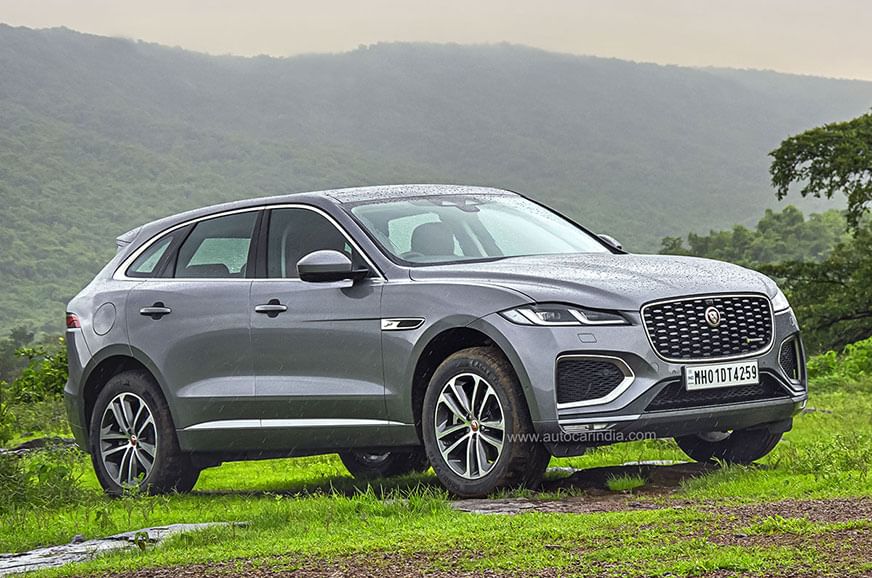2021 Jaguar F Pace facelift review, test drive
The facelift for Jaguar’s first SUV addresses some key issues; and how.
Published on Jul 23, 2021 03:25:00 PM
65,726 Views
We Like
- Luxurious interior
- Stunning exterior
- Driving dynamics
We Don't Like
- Road noise
- Low-speed ride, Fiddly touch-panel switches
2021 Jaguar F Pace facelift: what is it?
Grace, pace and space – that’s how the old Jaguar adage goes, right? And the good news is most modern Jags fit that bill. They’re bewitching to behold, enthralling from behind the wheel, and especially in the case of the F-Pace, roomy on the inside. However, that adage doesn’t factor in a few other areas important to luxury car buyers, and this is where recent Jaguar cars have fallen short of their rivals. With this 2021 facelift of the F-Pace, however, they seem to have addressed a few big problems. Let’s take a look.
2021 Jaguar F Pace facelift: what’s new outside?
When it comes to the F-Pace’s exterior design, I’m reminded of another popular phrase – if it ain’t broke, don’t fix it. Way back in 2015, Ian Callum and his team managed to deliver an SUV that was a true-blue Jaguar, with all the requisite styling cues and a truly rakish, sporting form factor, but which also was spacious and practical, as you’d expect for an SUV at its price.

Just as well, then, that the facelift doesn’t mess with the core formula at all, instead adding a few superfluous touches that simply accentuate it. The headlamps are now slimmer, high-def adaptive LED units and the ‘single J-blade DRL’ signature from before has evolved into a ‘double J-blade’ (ironically, BMW now does something similar with its headlamps). The grille is larger and speckled with dark metallic studs, while there are large air intakes to feed the radiators down in the bumpers.
At the rear, the tail-lamps have evolved into a wonderfully thin and minimalist interpretation of the rounded elements of old; now with two ‘bumps’ instead of one, mirroring the Double Js at the front. Further tidying up the rear is a new bumper with no visible exhaust outlets, and instead just a neat blacked-out insert resembling a diffuser. A slight disappointment is that the wheel size and design hasn’t changed at all; the twin-five-spoke 19-inch design is nice, but it’s the same one you used to get with the 3.0 V6 diesel version back in 2016.
2021 Jaguar F Pace facelift: what’s new inside?
One of those areas I mentioned earlier, where newer Jags weren’t quite up to scratch, was the interiors. And, oh boy, have they thrown out all the stops to remedy that. The F Pace dashboard is entirely new, with an excellent split design finished here in red and black (tan is also an option) with contrast stitching.
There’s far more brushed aluminium trim just about everywhere – the AC vent surrounds, the window switches (no longer sited on top of the door sills), the centre console, the speaker grilles, seat memory buttons, the AC controls, most of the steering wheel and the control stalks and huge shift paddles behind it. In fact, Jaguar has raided Range Rover’s parts bin, and that’s a good thing indeed. An unfortunate side effect, however, is that there are a lot more touch-sensitive switches – mirror, steering and AC controls to name some – which are needlessly fiddly to use. The old rotary gear selector is gone, and in its place is a small, stubby selector with stitching meant to resemble the seam of a cricket ball. It feels great to just lean your wrist on while driving, but don’t, because it shifts up and down with the lightest of touches.
Quality on just about every surface or touch point is vastly improved from the previous car, to the point that it feels like a new-generation model on the inside. Even the leather used in the upholstery feels softer and richer, and speaking of which, the seats are now a tad comfier, and offer lumbar support adjustment, which was missing earlier. Look hard and you’ll find some traces of the old F-Pace, like the basic-looking glovebox release, and the hard-to-reach rear-seat power-recline switch, which is straight out of a 1990s Ford.
With that, on to the rear seat, which like the ones in the front, feels a tad less firm in the cushions now, and as before, there’s a surprising amount of space on offer here. Creature comforts include two separate rear zones for the climate control and a huge panoramic sunroof, which unlike before is a single piece of glass and does not open. Curiously, however, there are no rear USB ports; just a 12V socket for charging.
2021 Jaguar F Pace facelift: features and tech
While there aren’t USB ports at the rear, it’s good that Jaguar has offered both, a USB 3.0 and a Type-C port up front, to cater to both needs; however, there are just those two. That aside, you do get a good amount of equipment, with things like high-definition adaptive LED headlamps, a new-gen digital instrument cluster that’s clear and very customisable, auto headlamps and wipers, 12-way powered front seats with driver-side memory, four-zone climate control, a powered tailgate, a panoramic glass roof, 360-degree cameras with a high-res display, wireless phone charging, a powered tailgate and configurable ambient interior lighting.
Features we’d have liked to see, however, are heated or cooled seats, powered steering-column adjustment and perhaps some window blinds for the rear passengers. Plus, the Clearsight rear-view function from the I-Pace that shows a camera display in the rear-view mirror would have been a cool add-on.
Worth highlighting is Pivi Pro – JLR’s new infotainment system that debuted in the Land Rover Defender. Like the rest of the interior, it’s a whole new world compared to the old InControl Touch system, and finally puts Jaguar up there alongside the best in the infotainment business.
It uses an 11.4-inch touchscreen, and while some rivals offer a larger number in that respect, note that this screen uses a 16:9 aspect ratio (like a TV) rather than a slimmer one (like a smartphone) so there’s more usable surface area. It’s also gently curved, which is a nice touch, and it sits slightly proud of the dash, rather than inset like the old one, bringing it a few precious centimetres closer to your fingertips.
The screen is high definition, it slides through slickly and responds to a very light touch. Moreover, the interface is cleanly designed with easy-to-understand iconography and clear typography that looks truly modern and cool. You can get detailed real-time driving data, as well as graphics for drivetrain functionality. It supports Apple CarPlay and Android Auto (albeit not wirelessly), intelligent voice commands, and has an onboard e-SIM.
2021 Jaguar F Pace facelift: how is it to drive?
The one area where things haven’t changed at all is the powertrain. You can have the F-Pace with either a 2.0-litre turbo-petrol or turbo-diesel engine, and while the petrol is the same 250hp, 365Nm unit as before, the diesel is an upgraded 200hp, 430Nm unit with mild-hybrid tech. We are driving the petrol version – now dubbed ‘P250’ rather than ‘25t’ – today.
As before, it is mated to ZF’s 8-speed torque converter automatic, but there seems to have been some improvement to its responses, shift speed and smoothness. Where previously JLR’s applications of this gearbox felt inferior to other brands that use it, now it appears to have been tweaked to work much better.
The engine remains rev-happy and not overtly turbocharged in its feel, which gels nicely with the F-Pace’s fun-to-drive nature. It sounds good too (to say nothing of the ‘enhancement’ played through the speakers in Dynamic mode) but then it’s also not the most refined petrol engine out there when you need it to be.
Speaking of Dynamic mode, it’s one of four selectable modes, and the good news is they all genuinely feel different from one another. Comfort and Eco are self-explanatory, and the fourth is Rain, Mud and Snow, which uses Land Rover’s off-road software tech (including low-traction launch mode) to help you in the rough.
As it has been since the 3.0 V6 version was discontinued, there is no air suspension on offer; JLR has now used that as a differentiator from the F-Pace’s sister car, the Range Rover Velar, which costs a full Rs 10 lakh more. There are no adaptive dampers either, but if anyone can pull off a great ride and handling balance, it’s Jaguar.
As before, the F-Pace is a tremendous handler, with agility that belies its size and weight. The steering can feel a tad heavy at low speeds, but it’s not too bad, and it really pays off once you go faster. It’s a similar story with the ride, which can feel a touch firm and lumpen, especially as the chunky tyres roll over broken roads, but the payoff comes at high speeds where it simply smothers everything you roll over. Both those compromises can be lived with, but a bigger annoyance is road noise, which is a constant companion in the cabin of this all-aluminium SUV.
2021 Jaguar F-Pace facelift: should you buy one?
The F-Pace is available in a single, fully loaded R-Dynamic trim and costs Rs 69.99 lakh (ex-showroom, India), irrespective of which engine you choose. This is not a huge price jump from the previous version, and it also continues to slot the Jaguar perfectly between the lower segment of the X3 and GLC, and the higher segment of the X5 and GLE.
Its size and spec fit that gap perfectly too, but after the facelift, the F-Pace feels greater than the sum of its parts. The new interior has transformed it from merely a good looking and driving SUV to the luxury item it always should have been, and which its price demands. So, if the F-Pace wasn’t on the radar in your search for a medium-size luxury SUV, it certainly should be now.
Related Images
Related Videos
Tech Specs
| Engine | Petrol AT |
|---|---|
| Fuel Type / Propulsion | Petrol |
| Engine Installation | Front |
| Type | 4-cyls, turbocharged |
| Cubic Capacity (cc) | 1997cc |
| Bore/Stroke (mm) | 83/92.29mm |
| Valve Train | 4 valves per cylinder |
| Max Power (hp @ rpm) | 250hp at 5500rpm |
| Max Torque (Nm @ rpm) | 365Nm at 1300-4500rpm |
| Transmission | Petrol AT |
|---|---|
| Drive Layout | All-wheel drive |
| Gearbox Type | Torque converter automatic |
| No of Gears | 8 |
| Efficiency | Petrol AT |
|---|---|
| Tank size (lts) | 82 litres |
| Acceleration | Petrol AT |
|---|---|
| 0 - 100 kph (sec) | 7.3 sec (claimed) |
| Body | Petrol AT |
|---|---|
| Weight (kg) | 1822kg |
| Dimensions | Petrol AT |
|---|---|
| Length (mm) | 4747mm |
| Width (mm) | 2071mm |
| Height (mm) | 1664mm |
| Wheelbase (mm) | 2874mm |
| Ground Clearance (mm) | 213mm |
Copyright (c) Autocar India. All rights reserved.


